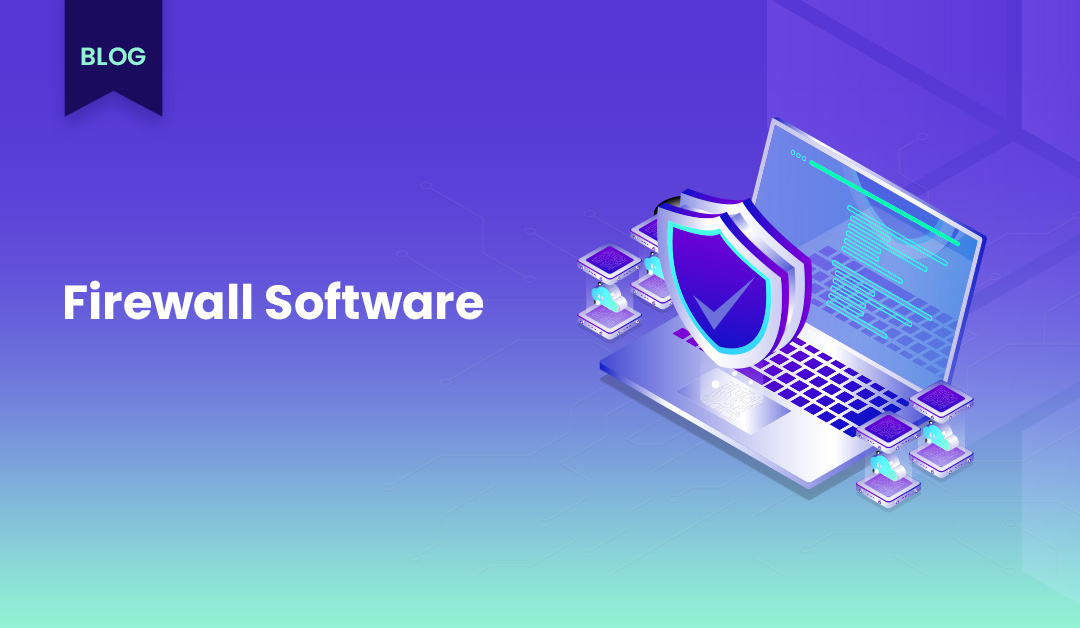What is Firewall Software?
Cybersecurity has become increasingly important in today’s digital era. As a link in this security chain, firewall software plays a crucial role in ensuring the safety and integrity of your networks and systems. This article delves into the depths of firewall software, explaining its fundamental principles, operations, features, types, and benefits. We will also explore […]
Author
Date
Category
All Categories
- AI-powered security
- Attacks & Threats
- Cybersecurity
- Hybrid Cloud
- Network
- Network Firewall
- Network Protection
- News
- Remote Workforce
- Security
- Zero Trust
Contents
Popular Posts
Product
Join the Newsletter

Cybersecurity has become increasingly important in today’s digital era. As a link in this security chain, firewall software plays a crucial role in ensuring the safety and integrity of your networks and systems. This article delves into the depths of firewall software, explaining its fundamental principles, operations, features, types, and benefits. We will also explore how it compares to hardware firewalls and discuss how to select the right firewall software for your needs.
What is Firewall Software?
Firewall software is a security system application that acts as a gatekeeper between your network and the outside world. It monitors, filters, and controls both inbound and outbound network traffic based on predetermined security policies. The software permits approved traffic while denying all unauthorized and potentially harmful traffic, providing a defensive shield for any device connected to the network.
Firewall software can be installed on various devices, including personal
-
Computers,
-
Laptops and
-
Servers, running different operating systems like Windows, macOS, and Linux.
It can also be integrated into dedicated hardware as a firewall distribution. However, in this discussion, we differentiate a software firewall from a hardware firewall based on the deployment method—on-host versus as a dedicated network device.

How Does Firewall Software Work?
Firewall software operates in several layers of a system to provide comprehensive protection. It can be found embedded in Internet of Things (IoT) devices.
When installed on a host, the software can make granular network access decisions down to the application level. For instance, it can allow a web server application to receive inbound connections on standard TCP ports for HTTP traffic—ports 80 (HTTP) and 443 (HTTPS).
Only certain services required for normal network operations will be allowed through the firewall, and policies can be set based on profiles. For instance, a domain profile might be for connections to an organization’s domain controller, a private profile for home connections, and a public profile for connections to public and unprotected networks like Wi-Fi at a local coffee shop.
What are the Features of Firewall Software?
Firewall software is imbued with several features, providing comprehensive security coverage. These features include:
-
Small Footprint: The software operates on a host alongside other applications, sharing system resources like disk space and compute.
-
Secure: As a security product, a firewall must be secure and inaccessible to other applications or users. This might require tightening user access controls on the host platform to restrict local configuration changes.
-
Cost: Typically, firewall software is included in the host product, so there’s usually no fee for the software itself. However, there might be fees for central management or additional features like advanced threat prevention.
How Firewall Software Differs from Hardware Firewalls?
While both hardware and software firewalls serve the core purpose of protecting networks, their deployment locations and controlled aspects vary slightly.
Hardware firewalls are deployed on the network and provide network-level functionality. They sit as a border device separating different parts of a network, enabling network-level operations like routing and network address translation (NAT). They also offer benefits like centralized management due to their ability to separate large groups of computers.
On the other hand, software firewalls run on the host, providing them with capabilities such as granular application-level access, integration with Endpoint Detection and Response (EDR), and device security.
What are the Types of Firewall Software?
There are various types of firewall software, each suited to different security needs:
-
Host-Based Firewalls: These are installed on specific devices and focus on protecting them from local threats.
-
Personal Firewalls: These are integrated into single-user devices like PCs or laptops, providing basic network security for individual users.
-
Endpoint Protection Firewalls: Tailored for enterprise-level security, these comprehensive security suites protect network endpoints with advanced features.
What are the Key Components of Firewall Software?
Firewall software comprises several key components that work together to provide robust network security:
-
Deep Packet Inspection (DPI): This involves analyzing packet contents beyond their headers to identify any irregularities or malicious codes.
-
Rule-Based Filtering: This forms the core of software firewalls, where predefined rules determine whether incoming or outgoing packets are permitted or blocked.
-
Application-Level Control: These firewalls offer granular control over individual applications’ access to the network.
-
Stateful Inspection: This type of deep inspection involves tracking the state and context of active connections, enhancing security by examining the complete communication flow.
Benefits of Firewall Software
Software firewalls offer several key benefits over hardware firewalls:
-
Granular Security: A software firewall provides direct device-level and application control of the host network access—both inbound and outbound.
-
Mobile Security: Software firewalls travel with the device—both on-network and off, ensuring consistent security coverage.
-
Improved Device Visibility: Software firewalls offer deep visibility into device network activity that can be used by an endpoint detection and response (EDR) solution.

Choosing the Right Firewall Software: Which Firewall Software is Right For You?
The choice between software and hardware firewalls should depend on what you aim to secure. If you have mobile users or employees who work from home, then software firewalls might be the right choice. If you need to secure remote sites, a hardware firewall acting as a perimeter gateway might be more appropriate.
Consider a third option—a firewall-as-a-service (FWaaS)—if you need to secure both remote users and sites but don’t require granular device-level or site-level access control. For securing private or public cloud infrastructure, you might want to consider a cloud firewall.
Configuration of Firewall Software
Setting up firewall software involves defining specific rules and configurations to tailor protection against malware, unauthorized access, and cyber threats. This process requires an understanding of your network’s structure, the devices within it, and the potential security threats you face.
Challenges and LimitationsLimitities of Firewall Software
Despite its benefits, deploying and managing software firewalls can pose challenges. Intensive processing demands might impact system performance, and misconfigurations can inadvertently create vulnerabilities. Additionally, managing multiple firewalls across diverse devices requires continuous updates, which can be complex and time-consuming.
Conclusion
As cyber threats continue to evolve, firewall software remains a critical line of defense in securing networks and systems. By understanding its role, benefits, and potential challenges, you can make informed decisions on the best firewall solution for your specific needs. Whether you opt for a software firewall, a hardware firewall, or a combination of both, remember that maintaining a robust security posture is paramount in today’s digital landscape.
FAQ
Examples of software firewalls include host-based firewalls, personal firewalls, and endpoint protection firewalls. Each is designed to cater to different security needs and environments.
No, firewalls can be for both software and hardware. While software firewalls are installed on specific devices like computers or servers, hardware firewalls are physical devices that protect an entire network.
Software firewalls control network traffic to prevent unauthorized access, while antivirus software scans the system to detect and remove malicious software. Both are crucial components of a comprehensive security solution.
Get Started with Timus
Zero Trust. Adaptive Cloud Firewall. Secure Remote Access. In one.
